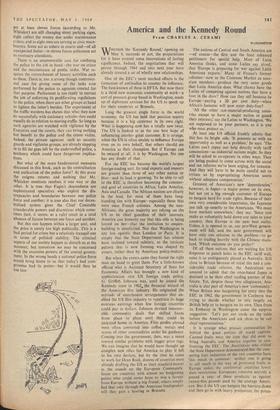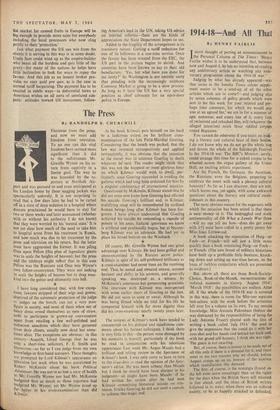America and the Kennedy Round
From CHARLES A. CERAMI
WASH INGTON
WE ER the 'Kennedy Round,' opening on May 4, succeeds or not, the preparations for it have created some innovations of lasting significance. Indeed, the negotiations that will persist through 1964 and into next year have already created a set of wholly new relationships.
One of the EEC's most marked effects is the formation of antibodies to counter its influence. The best-known of these is EFTA. But now there is a third new economic community at work—a sort of pressure group based in Washington, made up of diplomats anxious for the US to speak up for their countries at Brussels.
Long the greatest single force in the world economy, the US has held that position mainly because it is a big customer in its own right. What is happening now has a totally new twist. The US is looked to as the one best hope of influencing another great customer. It is strange, when the US is often unable to influence Europe even on its own behalf, that others should see America as their champion. But if Europe can be swayed at all, it is by Washington. No one has any doubt of that.
For the EEC has become the world's largest foreign-trading unit. Its total exports and imports are greater than those of any other nation or bloc—and its lead is growing. To be able to sell to the EEC is therefore becoming the commer- dell goal of countries in Africa, Latin America, Asia and Canada. The African nations are clearly in the lead, for most of them have long- standing ties with Europe—especially those that were once French colonies. Among the non- Africans, the great majority are relying on the US to be chief guardian of their interests. America can honestly say that this role is being forced on her—that the invitation to empire- building is unsolicited. Not that Washington is any less egoistic than London or Paris. It is simply that the State Department has seldom been inclined toward subtlety, so the intricate pattern that is now forming was shaped by events, rather than by American policy-makers.
But when the events came they found the right man on hand to greet them. For a little-known official who is Assistant Secretary of State for Economic Affairs has brought a new kind of sophistication into US foreign trade policy. G. Griffith Johnson was, until he joined the Kennedy team in 1962. the financial wizard of the American film industry. He originated the myriads of unorthodox arrangements that en- abled the US film industry to repatriate its huge overseas earnings when few foreign countries could pay in dollars. Johnson devised innumer- able commodity deals that shifted funds from place to place until they could be jockeyed home to America. Film profits abroad were often converted into coffee, metals and scores of other commodities under his guidance. Coming into the government, then, was a move toward similar problems with bigger price tags. We can imagine that he would have thought up complex new roles for America to play if left to his own devices; but by the time he came to work for Dean Rusk, dozens of countries were already drafting the US as their standard-bearer in the assault on the European Community. Some are countries with almost no bargaining points who could never hope to win a favour from Europe without a big friend; others simply feel that only through the American loudspeaker will they gain a hearing in Brussels.
The nations of Central and South America are —of course—the first and the least ashamed petitioners for special help. Most of Latin America thinks, and some Latins say aloud, that 'Europe is preparing for war against Latin American exports.' Many of France's former colonies—now in the Common Market as asso- ciate members—produce the very same goods that Latin America does. What chance have the Latins of competing against nations that have a foot in the door? How can they sell bananas to Europe—paying a 20 per cent duty—when Africa's bananas will now enter duty-free?
'All the other raw-material-producing coun- tries except us have a major nation to guard their interests,' say the Latins to Washington. 'We are supposed to be your partners, so it is you who must protect us.'
At least one US official frankly admits that this has its bright side. 'It presents us with an opportunity as well as a problem,' he says. The Latins can't repay our help directly with tariff concessions—as industrial nations might. So they will be asked to co-operate in other ways. They are being pushed to come across with the social and tax reforms we've been urging, for instance. And they will have to be more careful not to irritate us by expropriating American assets without adequate compensation.'
Greatest of American's new 'dependencies,' however, is Japan—a major power on its own, but not yet a big enough customer of Europe to bargain hard for trade rights. Because of their own very considerable importance, the Japanese can talk up smartly to the Americans. 'We must have markets somewhere,' they say. 'Since you make us voluntarily hold down our sales to your country, then Europe is the next best outlet. Unless it is opened to us, our pro-West govern- ment will fall, and the next government will have only one solution to the problem—to go back to trading heavily with the Chinese main- land. Which outcome do you prefer?' Of all these nations that are waiting for US firepower to punch holes in the EEC tariff wall, none is so ambiguously placed as Australia. Still close to Britain because of royal ties and a con- siderable trade relation, the Australians are amazed to admit that the once-hated Japan is destined to be their chief trading partner of the future. Yet, despite those two allegiances, Aus- tralia is also part of America's new 'community.' When Britain was bargaining for entry into the EEC in 1962. the government in Canberra was trying to decide whether to rely largely on British help or to bargain on its own. Then from its Embassy in Washington came the surprise suggestion : 'Let's put our cards on the table before the Americans and ask them to be our chief representatives.'
It is strange what prosaic commodities lie behind the great politics of world capitals. Canned fruits were the item that did most to bring Australia and America together in con- fronting the EEC. The Australians who visited the State Department demonstrated that the com- peting fruit industries of the two countries have this much in common: neither one is going to sell much in the way of processed fruits to Europe unliss the continental countries lower their restrictions. Europeans consume scarcely a pound a year of these products, as against twenty-five pounds used by the average Amer--
• can. But if the US can bargain the barriers down and then go in with heavy promotion, the poten- tial market for canned fruits in Europe will be big enough to provide more sales for everybody including the local processors who now cling pettily to their 'protection.'
Just what payment the US can win from the clients it is serving in this way is in some doubt. Uncle Sam could wind up as the empire-builder who bears all the burdens and gets little of the gravy—for many of the nations he helps have little inclination to look for ways to repay the favour. And this job as an honest broker pro- vides no easy quid pro quo, as is the case in normal tariff bargaining. The payment has to be exacted in subtle ways—in deferential bows to American wishes on all sorts of unrelated sub- jects: attitudes toward US investment, follow-
ing America's lead in the UN, taking US advice on internal reforms—these are the kinds of appreciation the State Department hopes to see.
Added to the fragility of the arrangement is its transitory nature. Getting a tariff reduction for one of its followers is a one-time service. Once the favour has been wrested from the EEC, the US part in the picture begins to shrink. And countries have been known to say to their old benefactors: 'Yes, but what have you done for me lately?' So Washington is not entirely sorry that pleading with the increasingly stubborn Common Market is going to be a slow process. As long as it lasts the US has a very special position as chief advocate for an open-door policy in Europe.















































 Previous page
Previous page